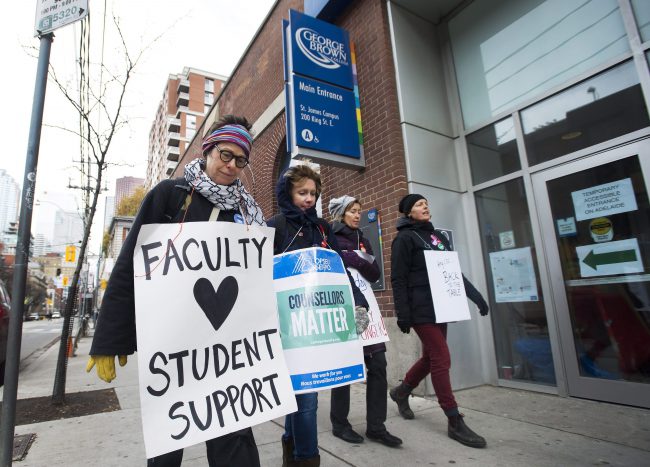TORONTO – An arbitrator appointed to settle a contract dispute with Ontario college faculty after a five-week strike granted them a 7.75 per cent raise over four years in a decision issued Wednesday.

The 12,000 professors, instructors, counsellors and librarians were legislated back to work last month and outstanding issues were sent to binding mediation-arbitration.
The arbitrator’s decision also includes new language on academic freedom, which had been the main outstanding issue between faculty and the colleges.
Both sides cheered the wording of that new contract section.
READ MORE: Ontario college strike: Back-to-work legislation on track to be pushed through Sunday
The Ontario Public Service Employees Union, which represents the faculty, said it “will now allow faculty to speak freely about academic issues without fear of reprisal.”
The colleges, meanwhile, said the academic freedom section enshrines in a contract the policies that already exist at most colleges.
“Faculty have always had academic freedom from a policy perspective in the institutions – all it’s done is put it in the context of the collective agreement,” said Don Sinclair, the CEO of the College Employer Council.

Get breaking National news
“The issue was that the language the union had tabled was such that they would have no accountability with respect to academic freedom. It would essentially give the union – for lack of a better word – control over academic programming. In other words, ‘I don’t even have to teach to the curriculum that I’ve been presented with because I’m going to exercise my academic freedom because I think I know better.”‘
READ MORE: Ontario college strike: OPSEU promises to challenge back-to-work legislation
The salary increase is the same as what the colleges had offered before the strike.
Hundreds of thousands of students were kept from class during the strike, and about 27,500 of the roughly 250,000 full-time students decided to withdraw and receive a tuition refund rather than finishing their semester on a condensed timeline.
OPSEU said the deal could have been reached at the bargaining table and the strike avoided if the colleges had displayed “even the slightest concern for students and staff during negotiations.”
WATCH: College students back to class after 5-week strike
_848x480_1100934723704.jpg?w=1040&quality=70&strip=all)
“With any reasonable amount of co-operation from the colleges, there would never have been a strike, students would not have had to worry about losing their semester, and faculty would never have lost five weeks’ pay,” JP Hornick, the head of the OPSEU bargaining team, said in a statement.
“It is clear now that college faculty are the ones willing to stand up for the positive changes our system needs by standing strong in solidarity.”
The new contract also includes improved job security for partial-load and full-time faculty and a new government-run task force that will make recommendations on faculty complement, precarious work, college funding, student success, and governance issues, OPSEU said.







Comments